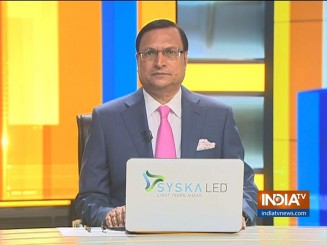 In his aim to achieve a hat-trick in Lok Sabha elections, due next year, Prime Minister Narendra Modi on Tuesday gave a clarion call to his party men to reach out to Muslims, Christians and other minorities and ensure that the benefits of welfare reach every household among the marginalized communities.
In his aim to achieve a hat-trick in Lok Sabha elections, due next year, Prime Minister Narendra Modi on Tuesday gave a clarion call to his party men to reach out to Muslims, Christians and other minorities and ensure that the benefits of welfare reach every household among the marginalized communities.
Addressing the BJP national executive, Modi cautioned party workers about any sense of complacency or overconfidence, and then spoke about how to begin a nationwide outreach towards minorities, particularly Muslims.
Modi said, “We should be in front of a church on Sunday when mass gatherings take place. Similarly, we should reach out to the Sikh community. Our objective to build the Ram temple in Ayodhya has been achieved, but we also need to introspect whether we have been to the temples built for Sant Ravidas and Mahrashi Valmiki? We should celebrate Ravidas Jayanti and Valmiki Jayantiand developed strong bonding with the marginalised and downtrodden communities. We should meet Pasmanda Muslims (Dalit and Backward Muslims), Bohra community, Muslim professionals and educated Muslims and tell them about the welfare work that we have done.”
Modi spoke about ‘Bharose Ka Rishta’ (a relationship of trust) with the Muslims. He said, BJP workers should not be worried about those Muslims who are normally unwilling to vote for the party and gave the example of the party’s outreach towards Pasmanda Muslims in several states. The Prime Minister advised his party men to avoid making unnecessary remarks about Muslim community that could result in a communal divide.
The national executive, as expected, extended the tenure of the present party president J P Nadda till June, 2024, with Home Minister Amit Shah saying, “under the leadership of Prime Minister Modi and organizational leadership of J P Nadda, BJP will win with a bigger margin in 2024 and Modi Ji will be the Prime Minister once again.”
This is not the first time that Modi has spoken about an outreach towards minorities and the need to refrain from making unnecessary remarks about Muslims. During 2014 Lok Sabha elections, I remember Modi saying in ‘Aap Ki Adalat’, that I want to see the day when Muslim youths will be holding the holy Quran in one hand, and a computer in another. Modi had been speaking about ‘Ek Bharat, Shreshta Bharat’ and ‘Sabka Saath, Sabka Vishwas, Sabka Vikas’. He had described those engaged in mob lynching as criminals. He brought laws to end ‘triple talaq’ and ‘halala’ traditions, which were welcomed by Muslim women in particular.
The manner in which Prime Minister Modi spoke about removing misgivings from the minds of Muslims about BJP clearly indicates that this is achievable, though it may not be an easy work. If the party gets even partial success in this endeavor, it could prove to be a gamechanger in the next Lok Sabha elections.
The opposition, in particular Congress leader Rahul Gandhi, had been saying ad nauseum that there is ‘anger’ among the people towards BJP, and that Modi’s call for an outreach towards Muslims could be a deceptive move.
The fact is that Modi and his party has given houses to the poor, provided taps for drinking water, connected every village with roads and internet, distributed free foodgrains to nearly 81 crore people, transferred Rs 22 lakh crore through direct benefit transfer, ensured that 223 Covid vaccination doses were given during the pandemic: all irrespective of religion and caste. No differentiation was made between Hindus and Muslims while providing these public welfare benefits.
BJP leaders and workers are confident about the love and affection that Modi has received from beneficiaries from all religions and castes, and this positive outlook can help the party in reaping rich dividends in the next Lok Sabha elections.